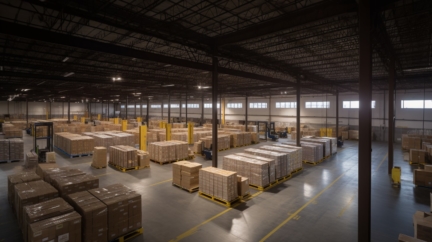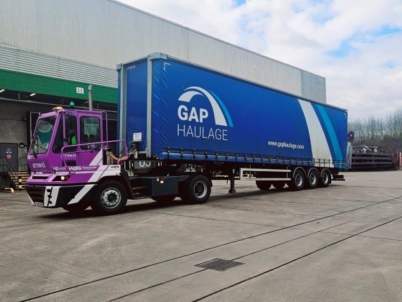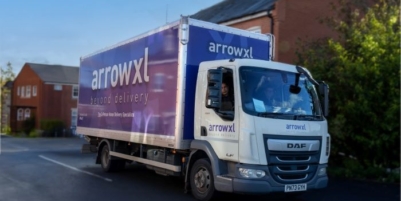-
Nutrivend selects Forterro’s Orderwise to support online expansion and streamline operations - April 11, 2025
-
ARROWXL LAUNCHES AMBITIOUS ZERO WASTE ROADMAP - April 8, 2025
-
THE BCMPA’S NEW CAMPAIGN DRIVES OUTSOURCING SUCCESS IN Q1 - April 7, 2025
-
BLACKOUT TECHNOLOGIES TARGETS TELEMATICS-INTEGRATED MOBILE DEVICE BLOCKING TO COMBAT SMARTPHONE DISTRACTION - April 1, 2025
-
Sparck Technologies awarded Royal designation - March 27, 2025
-
OpenADR Alliance announces first OpenADR 3.0 certified products with EVoke Systems, E.ON Energy and Universal Devices - March 25, 2025
-
Growing fulfilment and contract packer appoints new Managing Director - March 25, 2025
-
When is it time to invest in a WMS? Understanding the key trigger points - March 25, 2025
-
eCapital helps Vantage Recruitment on its journey to financial success - March 24, 2025
-
Hugo Beck Celebrates 70 Years of Packaging Innovation with Open House Events - March 20, 2025
Effective logistics management is crucial for success in today’s fast-paced and competitive business environment.
As companies expand their reach and deal with complex supply chains, they are increasingly turning to third-party logistics (3PL) providers to streamline their operations. To enhance efficiency and maximise productivity, businesses are leveraging 3PL software solutions.
In this article, we will explore how companies can harness the power of 3PL software to achieve success in their logistics operations.
- Streamlining Order Management
One of the key benefits of 3PL software is its ability to streamline order management processes. Traditional manual order processing can be time-consuming and error-prone, leading to delays, customer dissatisfaction, and increased costs.
With 3PL software, companies can automate order processing, reducing manual intervention and minimising the risk of errors. Advanced features such as real-time order tracking, inventory visibility, and automated notifications empower businesses to provide a seamless and efficient experience to their customers.
- Enhancing Inventory Visibility
Effective inventory management is vital for maintaining optimal stock levels, minimising stockouts, and reducing carrying costs. 3PL software provides businesses with real-time visibility into their inventory across various locations and warehouses.
With accurate inventory data at their fingertips, companies can make informed decisions regarding replenishment, storage, and order fulfilment. This visibility also enables businesses to identify slow-moving or obsolete inventory, facilitating proactive measures to optimise stock levels and reduce wastage.
- Optimising Warehouse Operations
Warehousing forms a crucial part of the logistics ecosystem, and inefficient warehouse operations can lead to bottlenecks and increased costs. 3PL software offers robust warehouse management capabilities, including inventory tracking, bin management, and pick-and-pack optimisation.
These features enable companies to streamline their warehouse operations, reduce order processing times, and improve overall operational efficiency. By leveraging 3PL software, businesses can effectively utilize their warehouse space, reduce labour costs, and enhance order accuracy.
- Facilitating Efficient Transportation Management
Transportation management is a critical aspect of logistics, and companies often face challenges in optimising routes, reducing transportation costs, and ensuring timely deliveries.
3PL software provides powerful transportation management features that enable businesses to optimise routes, consolidate shipments, and track deliveries in real time.
By leveraging these features, companies can reduce transportation costs, improve on-time delivery performance, and enhance overall customer satisfaction.
- Enabling Data-driven Decision Making
In today’s data-rich environment, making informed decisions based on accurate and real-time data is essential for business success. 3PL software collects and analyses data across various aspects of logistics operations, providing valuable insights into key performance indicators (KPIs) such as order fulfilment rates, inventory turnover, and transportation costs.
With access to these insights, businesses can identify trends, uncover areas for improvement, and make data-driven decisions to improve their logistics operations continually.
- Integrating with Other Business Systems
To achieve seamless operations and streamline data flow, it is crucial for 3PL software to integrate with other business systems such as enterprise resource planning (ERP), customer relationship management (CRM), and eCommerce platforms.
The integration allows for the seamless exchange of data, enabling businesses to automate processes, reduce manual data entry, and eliminate data silos. By integrating 3PL software with other systems, companies can achieve end-to-end visibility, enhance collaboration, and drive efficiency across their entire supply chain.
- Enhancing Customer Satisfaction
In today’s customer-centric landscape, providing an exceptional experience to customers is paramount. 3PL software plays a significant role in improving customer satisfaction by enabling accurate order fulfilment, real-time tracking, and proactive communication. With features such as automated notifications, customers can stay informed about their order status, ensuring transparency and building trust.
Additionally, 3PL software also allows businesses to offer value-added services to their customers. For instance, companies can provide customized delivery options, such as expedited shipping or specific delivery time slots, through the flexibility and agility offered by the software. By meeting and exceeding customer expectations, businesses can foster long-term relationships, drive customer loyalty, and gain a competitive edge in the market.
- Ensuring Regulatory Compliance
Compliance with industry regulations and standards is essential for logistics operations, especially when dealing with sensitive or regulated products. 3PL software often includes features that help businesses adhere to compliance requirements, such as tracking and documenting product expiration dates, managing hazardous materials, and maintaining audit trails.
By leveraging 3PL software, companies can ensure regulatory compliance, minimise the risk of penalties or fines, and uphold their reputation for responsible and ethical business practices.
- Scalability and Adaptability
As businesses grow and evolve, their logistics operations must scale accordingly. 3PL software offers scalability and adaptability to accommodate changing business needs. Whether a company expands its product line, enters new markets, or undergoes organisational restructuring, the software can be customised and configured to align with the evolving requirements.
This flexibility enables businesses to seamlessly integrate new processes, locations, or partners into their logistics operations, ensuring a smooth transition and uninterrupted service to their customers.
- Analytics and Performance Monitoring
Continuous improvement is a cornerstone of successful logistics operations. 3PL software provides robust analytics and reporting capabilities that enable businesses to monitor their performance, identify areas for improvement, and track the effectiveness of implemented strategies.
By analysing data on key metrics such as order accuracy, on-time delivery rates, and inventory turnover, companies can proactively identify bottlenecks, streamline processes, and enhance overall operational efficiency.
Conclusion
In conclusion, leveraging 3PL, order fulfilment technology like ControlPort is crucial for achieving success in logistics operations. 3PL software empowers businesses to streamline their key business processes freeing up time to focus more on providing great products and customer service.
By harnessing the power of 3PL software, companies can revolutionise their logistics operations, drive efficiency, reduce costs, and deliver exceptional customer experiences. Embracing technological advancements in logistics management is not just a competitive advantage; it has become a necessity for businesses to stay ahead in a rapidly changing marketplace.
As the logistics landscape continues to evolve, embracing 3PL software will undoubtedly be a key differentiator for businesses aiming to thrive in an increasingly complex and interconnected world. So, seize the opportunity, leverage 3PL software, and unlock the potential for success in your logistics operations today!
































